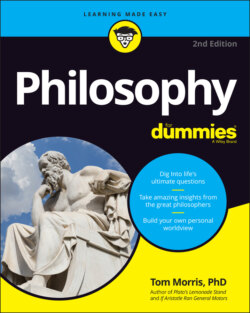Читать книгу Philosophy For Dummies - Tom Morris - Страница 56
Sense experience
ОглавлениеYou don’t need the testimony of others to tell you what’s going on in your room or other immediate physical space right now. And I’m the same. I know by sight that my computer monitor is on. I know by sight and touch that the keyboard is working. I can smell the delightful aftershave I just splashed on. I can hear the hum of my printer. And you have your own direct experience of yourself and your environment. A great number of present moment beliefs are just rooted in the immediacy of sense experience. In the first century BCE, the philosopher and poet Lucretius asked: “What can give us surer knowledge than our senses? With what else can we better distinguish the true and the false?” Our functioning senses and the sense experiences they yield provide our most basic ways of gathering any information about the world around us.
The skeptic, of course, wants to ask, “How do we know that sense experience is ever reliable?” You could see that one coming a mile away, at least if you can trust your own inferences. And what is the answer to the skeptic here? You may be tempted to say, “Look, I recall many times in the past seeming to see something, like a penny on the street, and when I got closer, there it was, just as it had appeared to be. So sense experience is sometimes reliable.”
This is almost embarrassing. First, if you think or say this, you are simply making use of your memory of a past experience. But, as you see in the preceding section on memory, nobody can come up with any good evidence that memory is ever reliable. Forget that for a moment, though, for the sake of argument. The little sample story suggested for you in the previous paragraph just recounted a memory of one initial sense experience that was later confirmed by what exactly? Another memory of another sense experience! So you confront the bane of circular reasoning again. If all sense experience has been called into question by the skeptic, it’s not sufficient for you to answer the challenge by appealing to a particular piece of sense experience, all of which is in question, and especially using memory, which has also been called into question.
Things are looking bad, so to speak. But that appearance might itself be deceiving, so hang in there. If you continue to read on in the coming paragraphs of this chapter, I promise that things are going to seem to get much worse for a few minutes, and then you’ll be truly amazed at what happens. Astonished. Shocked. You’re skeptical? Trust me. Aren’t you almost afraid to peek at beliefs about the future?
Here’s a relief. You don’t even have to go to any particular trouble to consider the reliability of distinctive beliefs about the future, because the same reasoning applies. You form such beliefs based on the past and present. And since you are realizing now that you can’t come up with any good reason for trusting the sources for your beliefs about the past and present, that just transfers over to an equal lack of justification for trusting any beliefs you have about the future. I leave it to you to think this through thoroughly, at some time in the future. Even Demosthenes saw in his ancient time that, “No man can tell what the future may bring forth.”
